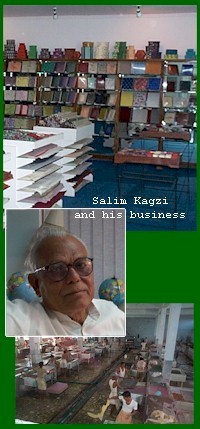|
|
|||
In Sanganer, near Jaipur the Kagzi clan preserves the art of hand-made paper |
|||
|
Tucked away in a village near Jaipur is the world's largest centre of hand-made paper! The variety that one finds in India is not just about different types of people and culture. There is surprise and variety in the number of economic activities too! Whole specialised craft-based businesses exist tucked away in pockets across the land. Each of these will narrate a fascinating tale. From Turkey. When the Uzbek, Ghiasuddin Babur finally defeated Ibrahim Lodi at Panipat in 1456, he was in addition to being a conqueror, a man with a vision for a grand empire. His hordes were not all armed soldiers. Bringing up the rear was a team of scholars, craftsmen, designers and theologists. Among these were a few papermakers drawn from Turkey. Their charter was to produce paper and parchments for the Moghul court. [Not to be asserted, but was this the moment paper was introduced India, as an alternative to the traditional palm leaf and fabric?]. Fast forward to Akbar's times. The small band of paper-makers had developed into a guild, restricted to those born into the clan. They had adapted the surname, Kagzi, after 'kagaz' meaning paper. And spread to Sialkot [now in Pakistan], Gujarat, Maharashtra and Jaipur. Of these the only surviving settlement of Kagzis today is at Sanganer, in the outskirts of Jaipur. Sanganer is blessed with water and open spaces, that are essential for paper making. From here the Kagzis enjoyed patronage of the royal court of Sawai Man Singh and his successors. And all seemed well. Hard times. By the eighteenth century, storm clouds gathered over the Kagzis. The advent of the Europeans, brought in their wake industrial produce of the west, among which was low-priced mill-made paper. Salimuddin Kagzi, now 65, recalls the trials of his father Janab Allahbux Kagzi. "From a prosperous village Sanganer, became a starving village. India was overwhelmed by 'modernity' and cost-effective products. Add to that the decline of royal grandeur. There was no market for hand-made paper." At this point we see the hand of , who else, Mahatma Gandhi! [Wonder what aspect of India's life he did not touch!]. Allahbux met Gandhi in 1937 and sought counsel. He in turn persuaded the textile mill-owners of Ahmedabad to extend business. For several decades thereafter, Sanganer supplied packaging materials for textiles. It was not anything to raise them to prosperity, but it kept the Kagzis of Sanganer and their skills alive. No such luck for Kagzis elsewhere. Salim Kagzi believes, they have all closed shop and the Sanganer settlement alone survives. New opportunity. It is difficult to resist a digression here. India today is at a similar juncture today. With its doors open to globalisation, there is a steady stream of low-priced products from overseas. There is widespread closure of small businesses. And a rising level of discontent. Let us hope there is a happy ending to all this as there was to the plight of Kagzis. Hope arrived in the late sixties with a world awakening to the perils of polluting industries while at same time realising the pleasures of hand-made objects. Slowly, Sanganer revived and arrived at the moment it understood that it was on to a great opportunity. What the world wanted from them was many usable hand made objects made of paper. From the obvious, letter pads and books, Sanganer began to produce gift boxes, desk accessories, mobiles, decorative objects etc. The conversion activity generated jobs and added to their pricing power. The Kagzi streak of enterprise was in flow again. Today there are about 10 hand-made paper industries in Sanganer, all owned by Kagzis. Of these the largest is Salim Kagzi's Handmade Paper and Board Industries, which singly and exclusively manufactures for the world's markets, paper products worth Rs.10 crores annually. Salim employs 600 people. Together, all Sanganer paper makers are the largest producers in the world. A unique clan. Except for the electric motors used for pulping, calendaring and peripheral activities, all production is manual. No chemicals whatsoever are used. All colouring is organic. Decorative effects are produced by inclusions such as petals, grass clippings and the like. Paper is dried under the sun. The water let out from the industries is benign. The input is cotton cut waste from garment industries. And the output goes to every advanced economy in the world. Kagzis are more wholesome than just business people. They preserve a remarkable heritage that grew out of the interactions of Turks with India. Over time, this heritage has become unique to India, worth a sociologist's attention. Though Kagzis are Muslims, they are fully integrated with the larger society. Allahbux was a member of the Congress party and worked with Gandhiji in the freedom movement. Son Salim is active in conducting the annual Ram Lila event, which is entirely Hindu in content! The wealthy Kagzis are austere and unostentatious! They live a frugal life. Their marriages are simple, group affairs where, everyone rich and poor contribute an equal sum of the order of Rs.5000 and share the same wedding feast. They are also quaint! Kagzis marry only among themselves! Though there are about 3000 of them in Sanganer, there can't be much choice for young people. Don't they marry among the larger Muslim population? Says Salim: "No! You see, we may be Muslims, but we are, above all Kagzis!!"
January,2001
|
|
||

